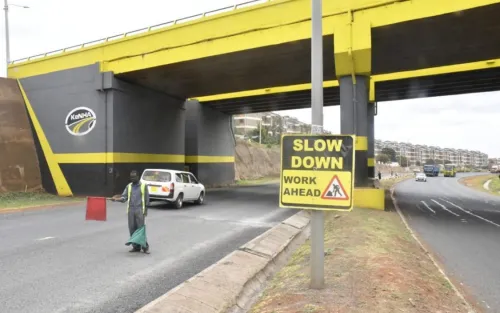The Kenyan government, through the Kenya National Highways Authority (KeNHA), has unveiled plans to establish a network of roadside stations along highways that will offer services such as restrooms, accommodation, parking, and restaurants for thousands of long-distance road users across the country.
These facilities are designed to cater to the needs of thousands of long-distance commuters, offering an array of services including restrooms, lodging, parking, and dining options.
Under the proposed regulations, KeNHA will supervise the construction and management of these stations, either independently or in partnership with private sector entities. This approach seeks to enhance accessibility and maintain consistent availability of facilities throughout the national road network.
Prospective developers interested in participating in the project will face a structured fee system, starting with a KES 20,000 application charge, followed by an annual operating license fee of KES 100,000 upon approval.
Unauthorized operation of such stations will result in a hefty KES 500,000 penalty, emphasizing the government’s commitment to regulating these essential services.
Trucks parked within parking stations for a duration of up to two hours will be exempt from charges, while those parked for two to seven hours will incur a fee of KES 200 in cities and municipalities, and KES 150 in other areas. For a 24-hour parking period, the fee will increase to KES 500.
Trucks parked outside the designated stations will face a daily penalty of KES 30,000. Additionally, a KES 2,500 charge will be imposed for towing trucks to the nearest roadside station for the first kilometre, followed by KES 2,000 for each additional kilometre.
The Kenya Revenue Authority (KRA) is set to play a crucial role in the financial oversight of the roadside stations by implementing geofencing techniques and maintaining a comprehensive registry of stations, their developers, and operators for taxation purposes.
The proposed stations are classified according to their size and capacity. Large stations will cover a minimum of 10 acres and accommodate over 200 parking spaces, while medium and small stations will offer scaled-down facilities to meet various traveller requirements.
Each station will include essential amenities such as restroom facilities, emergency assistance, and dining options, with larger sites providing additional services such as fuel stations, banking facilities, and internet connectivity.
Furthermore, the draft legislation introduces innovative measures such as smart gate technology for large and medium stations. This system aims to enhance security and tax compliance by integrating with customs monitoring systems to track vehicles entering and exiting the premises.
Existing service providers along major highways will be given a two-year window to align with the new regulations, highlighting the government’s intention to improve the quality and safety of roadside services systematically.
This comprehensive framework represents a significant step forward in addressing the long-standing challenges faced by road users in Kenya, promising a safer and more convenient travel experience.


















